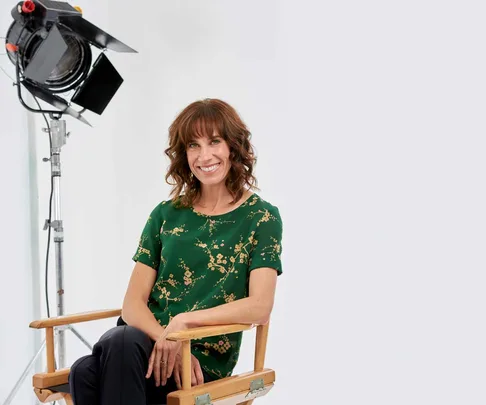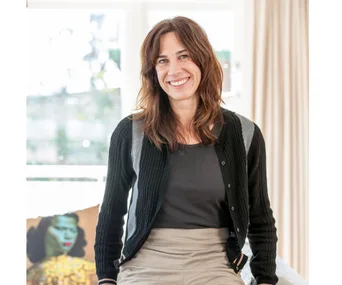Jackie van Beek
Ten years ago actress Jackie van Beek was teaching clown camp in Alice Springs, Australia, when she was given the chance to direct her first short film. What resulted was a sweet film about two indigenous boys, Jesse and Rodney, and their true struggle of trying to find a pair of shoes so that they would be able to attend school.
Since then, Jackie, now 41, has become a regular on our screens, starring in TV shows such as 800 Words and the Kiwi hit film What We Do in the Shadows. But it may be her latest movie, The Breaker Upperers, that seals her as one of our leading lights.
Expectations were high for the film – which she co-wrote, co-directed and co-starred in with actor Madeleine Sami – after a US critic said it “might even be funnier” than executive producer Taika Waititi’s Hunt for the Wilderpeople.
Currently the 15th top grossing New Zealand film of all time, The Breaker Upperers is centred around two nihilistic best friends and roommates who, soured by love, decide to set up a business carrying out others’ relationship break-ups. It’s intensely funny, but what gives this movie its heart is that it is a film about women, made by women.
“Part of the responsibility of being a director on The Breaker Upperers, we felt, was to give other women a chance,” says Jackie.
“We collected a really great creative team, people that were really experienced; people that we knew would respect our vision and not freak out at what we were trying to do.”
While she knows the world is making progress towards equality, Jackie says it’s essential for her to be a crusader for other women in the film industry. She says women still lack representation both in front of and behind the camera, currently making up less than 10 per cent of Kiwi directors.
“The focus on the imbalance of genders in our industry is so crucial and I’m so pleased that is happening now,” says Jackie. “There is nothing stopping females representing 50 per cent of directors out there, it’s not a lack of talent.”
She also wants to support those who have chosen to be a mother and maintain a career, revealing how early on in her career she had taught herself to “breastfeed with one hand and edit video with the other.
“My creative world just exploded,” Jackie says about how becoming a mother has influenced her work (she has three children, aged 6 to 10). “I feel like a more compassionate human being who can tell bigger stories with more depth.”
Aidee Walker

At seven months pregnant, many women might consider starting to take things a little easier. Not signing up for one of the biggest challenges of their career.
But for Aidee Walker there was never any doubt she’d take up the chance to be one of the first female directors of Westside following a campaign by production company South Pacific Pictures to have women make up 50 per cent of their directing team. The campaign came after discovering that out of 42 hours of television drama made by the company, only two hours of it had been directed by women.
“It’s really important we have lots of people telling different stories so it’s not just coming from one perspective,” says Aidee.
Despite directing four short films, music videos and web-series, Westside was Aidee’s first foray into television directing. She admits it was all-encompassing, requiring long hours on set while heavily pregnant.
During her stint, she found that a lot of the actresses had never worked with a female director before and often felt more comfortable taking direction from her.
Aidee also thinks there is something very special about a woman’s point of view, especially in terms of what women consider to be beautiful.
Through her scriptwriting – currently her main form of income – she is attempting to end the casting of women purely based on their appearance.
“‘She’s a babe’ doesn’t mean she’s a size 8 or she’s got massive boobs; that’s not necessarily how we (women) operate,” says Aidee.
But what she’d like to strive for even more is making it normal for a woman to have any job without it having to be prefaced by “female”.
“The idea is that instead of us being an inspiration, it becomes normal,” she says.
For now, though, she is excited to take some time off to spend with her new baby girl, Te Awaroa. Although it won’t be long before she is back at work, possibly even with a little one in tow.
Roseanne Liang

Once destined for medical school, Roseanne Liang listened to some sage advice from her sisters, who were already studying for medical degrees, and instead decided to take a gap year. During that time, she found her real destiny – film-making.
It has proved to be a good decision for the 39-year-old, who has been named as a female director to watch by The Hollywood Reporter. But despite appearing on the list alongside some of her own personal idols, Roseanne still feels that she hasn’t made it in the film world yet. She says it may be tall poppy syndrome, or her own self-doubt, but she knows it is something she has to overcome if she wants to land work in Hollywood.
“In New Zealand, the worst thing you can be is up yourself and I really subscribe to that. I’m a New Zealander through and through so I have to really suppress that urge to self-deprecate, to put myself down, to talk it down, because in America, if you don’t talk yourself up why on earth would they give you the job?”
Although Roseanne is best known for her semi-autobiographical film My Wedding and Other Secrets, it is her work as director on the short film Do No Harm that has brought her international attention. The action film was chosen to premiere at the Sundance Film Festival in 2017.
For such an avid lover of action films, it is surprising that Roseanne has never dabbled in the genre previously. The mother-of-two speaks about action with such love and passion it is as if she is talking about a third child.
“I love action because it’s actually the most physical reaction I can get in a film… it’s something that affects my body, it affects my heart and it’s the perfect connection.”
And for Roseanne, film is all about making a human connection, just as in real life.
“The kind of film-making I want to do is about people, it’s about dealing with them, collaborating with people, and it’s always magic to me being a captain of a crew.”
Being a leader, and even more so a role model, is not something that sits easy with Roseanne, yet she continues to be a crusader for getting more minorities in front of and behind the camera.
“Diversity is the real New Zealand and that’s what public broadcasting and public funds for film are about,” she says. “If New Zealand is filtered through only one lens, then that makes us all poorer. I genuinely believe that.”



